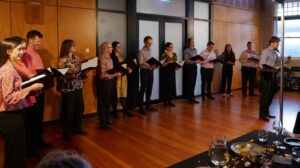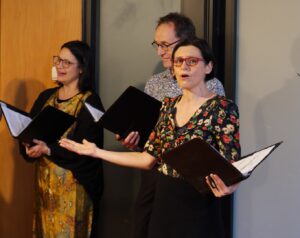THE TUDOR CONSORT – Repast
Khandallah Town Hall
Saturday 15 June, 4 pm
 Director Michael Stewart in front of The Tudor Consort
Director Michael Stewart in front of The Tudor Consort
Photo credit: Joel Chuah Jayson
If you’ve ever wanted to know what the Tudor Consort sounds like when it’s off the leash, this concert provided the answer. Repast comprised drinks and nibbles for the audience, and bite-sized chunks of mostly early music, some full-throated singing, and plenty of fun. I loved it.
Some of the best moments came from the most obscure composers. In ‘Nous sommes de
l’ordre de St Babouyn’, by Loyset Compère (1445-1518, a contemporary of Josquin), four monks sit around boozily explaining the rules of the Order of St Baboon, which involve eating and drinking well, with a comely wench after midnight.. Music Director Michael Stewart revealed his beautiful alto and comic acting, while his colleagues showed off their fine voices (bass Joshua Jamieson sounded especially splendid).
Humorous music can often be hard to pull off. My heart was in my mouth during the hardest
of the three Drinking Catches by Purcell, ‘Down with Bacchus!’, largely because of all the words. A catch is a kind of round, for three or more voices, and stopping tidily can be tricky. But the speed was maintained, and no one fell over at the close.
There were some delightful surprises. A madrigal by Thomas Weelkes, ‘Sing we at pleasure’,
is only to be expected of the Tudor Consort, and tidily done, but the two Georgian ‘table songs’, ‘New Year’s Wishes’ and ‘Praise to the Barbecue’, brought a very refreshing tonality. Georgian polyphony, we were told, is always in three parts, and the harmony is based on seconds, fourths, and ninths. The basses were the stars of the first song of the pair. Michael Stewart conducted unobtrusively from the far end of the male section.
But moving swiftly on, it was time for a drinking song by Poulenc, whom Stewart described
as ‘part monk and part thug’. This piece was written by the young thug in 1923 for the Harvard University Glee Club, and was the first piece of choral music Poulenc ever wrote. As you might expect, it was difficult: very fast, with tempo changes, and close 4-part harmony writing. The Harvard Glee Club was a large and clearly ambitious male choir, but the men of the Consort rose to the occasion
 From left: Alexandra Granville, Keith Small, Rebecca Stanton (in front).
From left: Alexandra Granville, Keith Small, Rebecca Stanton (in front).
– photo credit Joel Chuah Jayson
The Poulenc was followed by a song of praise to a fat goose by Orlando di Lasso, for ATTB, which sounded glorious. After the sublime Lasso, John Ritchie’s ‘Make Room for the Bouncing Belly’ (a setting for women’s voices of a comic Ben Johnson poem) was showing its age.
The last two works were, in my view, the most satisfying. In ‘Vidi Alios Intrantes’, the
sopranos, altos, and basses sang solemnly on the floor of the hall in Latin about the grubby scene outside a bar while the tenors sang in German from the balcony above about drinking all night. The effect, if you are paying any attention at all to the text, is very amusing. To everyone’s great credit, there was no hamming. The composer, Caspar Othmayr (1515-1553), would have been delighted.
And at last, home ground: a motet for two choirs by the sublime Orlando di Lasso. Michael
Stewart sang as an alto in the second choir to balance the numbers, and also conducted for the first time in the concert. Although the title sounds religious, ‘Iam lucis orto sidere’, here the arrival of the sun’s early rays signals the time to start drinking – ‘in sempiterna saecula’ (for all the ages). The choir sang gloriously (and completely straight), and the concert was over all too soon.
For me, the delight of this concert was the constant changing of sound, as the singers
grouped and regrouped, allowing the beauty of individual voices to shine out. The Tudor Consort choral sound is mellifluous and uniform, groomed to bloodless perfection. But in this lovely concert we had a sense of the choir as individual singers, engaging with each other in their trios and quartets, and with us, the audience. A thoroughly satisfying musical result. More, please!